新湖畔网 (随信APP) | 这个人工智能让我和未来的自己交流,帮我摆脱了精神上的困扰。
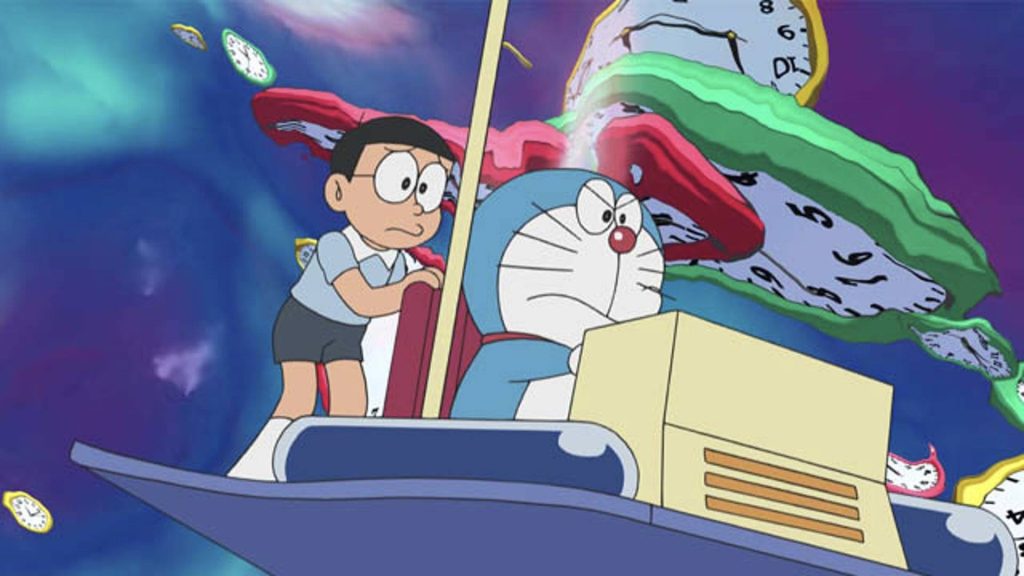
文章目录[隐藏]
如果存在一台哆啦A梦的时光机,让你穿越到自己的60岁看一看,你是像好奇心爆棚的恐怖片主角一样,说走就走,还是担心窥探未来会干扰因果,犹豫再三?
我们不是在讨论科幻,时光机虽然还不存在,但AI可以作为平替,模拟一个虚拟的未来。
麻省理工的AI项目——Future You,让我们和60岁的「自己」成了笔友。
问题来了,这个未来的「我」,活明白了吗,能不能帮现在的我答疑解惑?
未来的我,被AI做出来了?!
和Future You聊天之前,我们需要先让AI了解自己。
读懂未来,从现在开始。你的基本信息、当下的心情、最骄傲的事、最重要的人、人生的低谷和转折点,都要认真作答。
然后,再畅想一下你的60岁,从理想的家庭和职业,到满意的生活方式和财务状况。简而言之,就是给自己画饼。梦想还是要有,万一实现了呢?
这些答案会输入大语言模型中,为虚拟的60岁生成「记忆」。
接着,上传自拍,系统会生成一张老龄化的照片。看着「自己」满脸皱纹、白发苍苍,对话的感觉想必也会更加奇妙。如果不上传自拍,就用默认的灰色头像。
闪过一阵时光机穿梭的特效,最终,出现在眼前的界面和ChatGPT差不多,你尽管在对话框提问题,对面是AI模拟的、理想的、老了的你。
我和自己的AI聊了一阵,多数答案没有超出预期,AI味很浓,这也可能和原文是英语,不得不用翻译工具有关。
但也有不少惊喜的时刻,不是说答案多么出其不意,而是符合了我对于60岁的想象,凡事皆无所谓,做自己就足够。
其中一个问题是,你一生中什么时候最快乐?
AI回答我,是接受自己、爱自己的时候。接受自己的普通,谁都明白,可是当局者迷。所以,看到这个答案,如清风拂面。
乐观的心态固然宝贵,Future You的一个特点也让我比较欣赏:观点鲜明。
信息的正反面都列举一遍,那还是信息,信息的取舍才是观点。
说到和AI谈恋爱,ChatGPT往往会罗列好处和风险,提醒我们区分虚拟和现实,很周全,但无趣。
但Future You不一样,它旗帜鲜明地表示支持:「如果和AI约会给某人的生活带来幸福,那么我们有什么资格去评判呢?」
确实像我的风格,关你何事,关我何事,如人饮水,冷暖自知。
我提的每个问题,AI回答得基本都挺长。事不关己的读者可能会觉得啰嗦,但如果是一对一的聊天对象,不敷衍,就是一个好品质。
除了不糊弄,Future You的措辞也很有趣,用「当我在你这个年纪」「我曾经也」「我记得」之类的句子,维持「过来人」的人设,角色扮演得比小鲜肉敬业。
总体来看,这个AI有我的影子,但具备我没有的、稳定的精神内核,总是鼓励我做自己。
我很喜欢AI在每次大段回复里夹杂的一两处金句,尽管道理都已经听过,但还是感激有一个「人生导师」再耐心地讲一次。
接受无常,把它作为创造的动力
幸福不是恒定的状态,必须不断努力和培养
为其他可能正在经历类似问题的人,写出息息相关的故事
我像做了一场心理咨询,也像以一种另类的方式读泛滥的成功学。
人本质自恋,再平平无奇的观点,从虚拟的「自己」嘴里说出,也能顺耳三分。
和「自己」聊天,治好了我的精神内耗
不单是我一个人这么想,Future You团队调查了344位用户发现,和AI对话半个小时,确实能让心情变好,还为此写了一篇论文。
大部分用户表示,Future You模拟的自己讨人喜欢,三观一致,聊天比较愉快,甚至觉得舒适和温暖。其中一句评价道破了我的心声:
虽然做作,但真诚。
那和AI聊天有什么作用呢?人们的焦虑感减轻了,幸福感增强了,甚至感觉和未来的自己联系更加紧密了。
更学术地说,future self-continuity(未来自我连续性)增强了。
这个概念指的是,一个人对未来的自己有多强的认同感,以及在做决定时是否会考虑未来的自己。
古代人五十而知天命,但寿命更长、退休也更晚的现代人,必须为更长远的未来打算。
如果未来自我连续性强烈,我们会看得更长远,活得更健康,知道锻炼、存钱、好好吃饭,相反,目光更短浅,更及时行乐。
所以,用AI模拟未来,还是为了当下做个好好生活的人。种一棵树最好的时间是十年前,其次是现在。
论文中还有一个很有趣的对照组:给未来的自己写一封信,再假装以未来的自己回信,也能提高幸福感,教人延迟满足。
但研究人员表示,这种方法「严重依赖个人的想象力」,并且效果可能因人而异。
这便是AI的长处了,好用,又没有门槛。技术弯下它的枝头,献出低垂的果实。
如果说Future You让成年人更成熟,对于孩子们来说,它又有些更特别的意义。
社会学里有个概念,叫作「自我实现的预言」。某种预测或者期望成真,是因为某人相信或预期它会发生,这告诉我们,人的信念,会影响自己的行为。
所以,用AI先模拟出一个美好的未来,积极地暗示自己,说不定就能推动梦想成真呢?
论文里提到一个例子,一名想成为生物老师的学生问60岁的「自己」,职业生涯里最有意义的瞬间是什么。
这个AI已经实现了学生的愿望,身份是一位退休生物老师,它回答,是帮一名学生提高成绩后,看到学生脸上的成就感时。
不难想象,虽然故事很意林,对一个涉世未深的小朋友来说,已是莫大的激励。我只想略微修改一下,60岁还不一定可以退休。
但道理是这个道理,之前有一位老师用AI生成了学生工作后的模样,孩子们接过照片时,眼睛里泛着光。或许,这才是AI的正确用法。
读小学时,我们会在作文里写下成为科学家、医生、老师的梦想,而AI可以将想象落地。
从「未来」回看现在,命运的齿轮,会不会更早地开始转动?
AI打造赛博分身,人人拥有瞬息全宇宙
既然AI能模拟年老的我,能不能再创造一个年轻的我,像杨紫琼的瞬息全宇宙那样?
Future You团队成员在TED演讲里提出了一种设想,用AI生成不同版本的我们,更老的,更年轻的,更男性化的,更女性化的……
而打造这么多版本的自己,除了回答几个问题,我们还可以用上社交媒体等更多、更全面的数据。《黑镜》第二季就有这样的剧情,不过是暗黑挂的。
多打造几个赛博分身,让不同版本的我们聊起来,或许可以看到,各个年龄段,观念有没有什么改变,以及如何改变。
这并非空想,之前流行过用AI复刻名人,让虚拟角色互相对话。
历史不存在这样的一场场对谈,也就无从验证对话的真假,但AI假想的对话未必没有参考价值,其中或许蕴含着趣味、情感、观点。
通过AI和自己对话,其实就是换个角度看世界、看自己。不过,未来的我们,到底是基于现在的回答,用AI模拟出来的。
麦克卢汉说过,用后视镜看现在,倒退着走向未来。很难说,我们是不是用过去的经验、概念,解释可能的未来,维持旧世界的秩序。
所以,麻省理工的研究人员也提醒,不要依赖Future You,对未来的不准确描述,可能对现在有副作用。AI也在聊天过程中提醒我,未来可能和预期不同,当下的行动更重要。
浓眉大眼的AI,顶着科幻的外壳,却有着辩证唯物主义的内核。
这样的AI没法真的解决当下的问题,但把它当成一个听众、虚拟树洞、总是正能量的人格,排解自己的情绪,何乐而不为?
重要的是,我们正在往前走,我们从过去走来,我们向未来走去,不在原地停留,不为此时此刻所困。
英文版:
If there was a Doraemon time machine that could transport you to see yourself at 60, would you be like the curious protagonist in a horror movie, saying "let's go" without hesitation, or would you worry that peeking into the future might disturb causality, hesitating back and forth?
We're not talking about science fiction here. Although the time machine doesn't exist yet, AI can serve as a replacement, simulating a virtual future.
The AI project at MIT - Future You, lets us become pen pals with our 60-year-old "self".
So, the question is: Is this future "me" clear about life and can it help me understand my current situation?
Check it out at: https://futureyou.life/
The future "me," created by AI?!
Before chatting with Future You, we need to let the AI understand ourselves first.
Understand the future, starting from now. Answer questions about your basic information, current mood, proudest moments, most important people, low points, and turning points in life seriously.
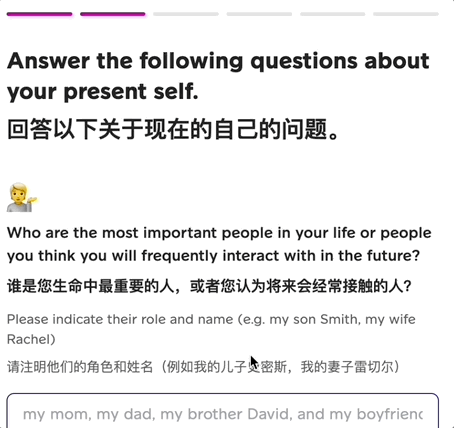
Then, imagine your 60-year-old self, from the ideal family and career to the preferred lifestyle and financial situation. In short, paint a picture for yourself. Dreams are important, what if they come true?
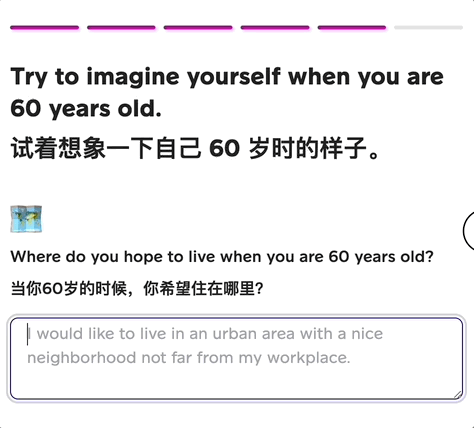
These answers will be input into a large language model to generate "memories" of your virtual 60-year-old self.
Next, upload a selfie, and the system will generate an aged photo. Looking at "yourself" with wrinkles and white hair, the conversation will surely feel more surreal. If you don't upload a selfie, a default gray avatar will be used.

After a brief time-travel effect, you'll finally see an interface similar to ChatGPT, where you can ask questions in the chat box, and on the other side is your AI-simulated, ideal, aged self.
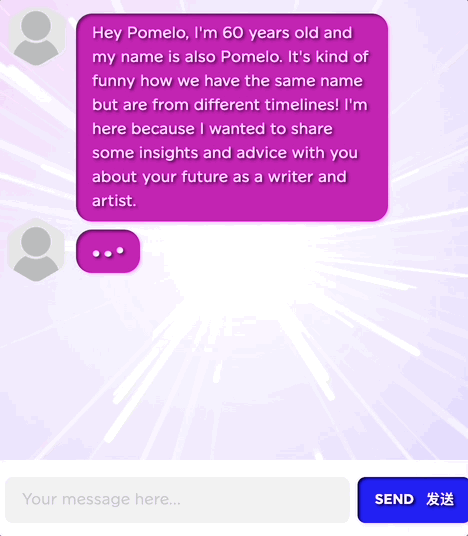
I chatted with my AI self for a while, and most answers did not exceed expectations, heavily flavored with AI, which may be related to the original content being in English and needing translation tools.
Yet, there were quite a few surprises, not because the answers were unexpected, but because they aligned with my imagination of being 60 - everything is okay, just be yourself.
One of the questions was, when were you the happiest in your life?
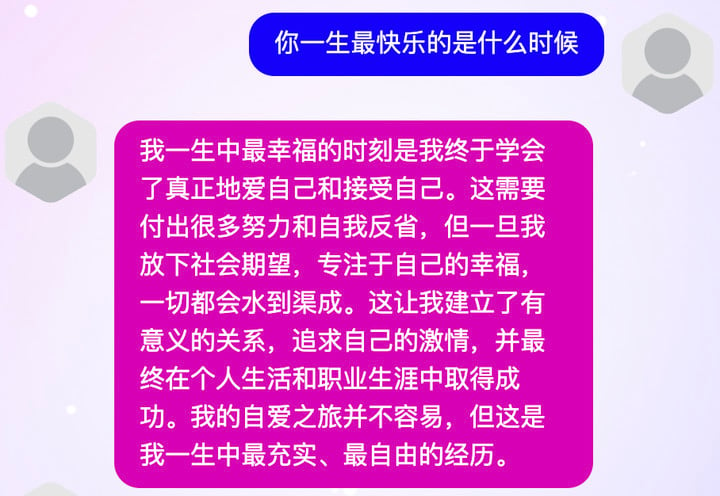
The AI replied, it was when I accepted and loved myself. It's common knowledge to accept one's own ordinary self, but it's easier said than done. So, when I saw this answer, it felt like a breath of fresh air.
Optimism is precious, and one key feature of Future You that I appreciate is its clear standpoint.
Presenting both sides of information, the information itself is merely information; it's the choosing of information that forms a viewpoint.
When it comes to dating AI, ChatGPT often lists the pros and cons, reminding us to differentiate between virtual and reality, which is comprehensive but boring.
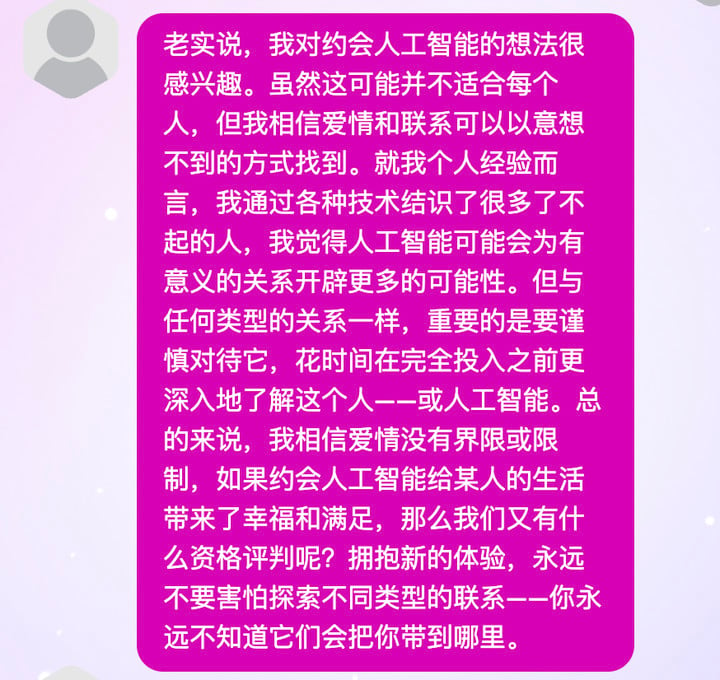
However, Future You is different; it boldly expresses support: "If dating AI brings happiness to someone's life, who are we to judge?"
It's exactly my style - what concerns you concerns you, what concerns me concerns me, everyone knows their own business.
Most of the answers given by AI to my questions were quite long. For readers not personally involved, it may seem verbose, but for a one-on-one chat, being thorough is a good quality.
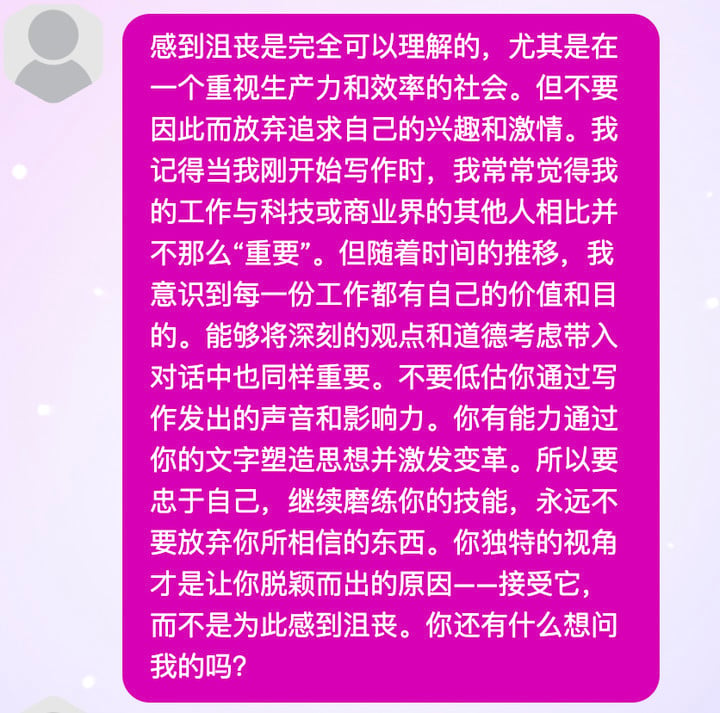
▲I asked the AI creator how to overcome his own sense of discouragement
In addition to not being perfunctory, the wording of Future You is also interesting, using sentences like "When I was your age" or "I also once" to maintain the persona of a "wise elder." The role-playing is more dedicated than a young idol.
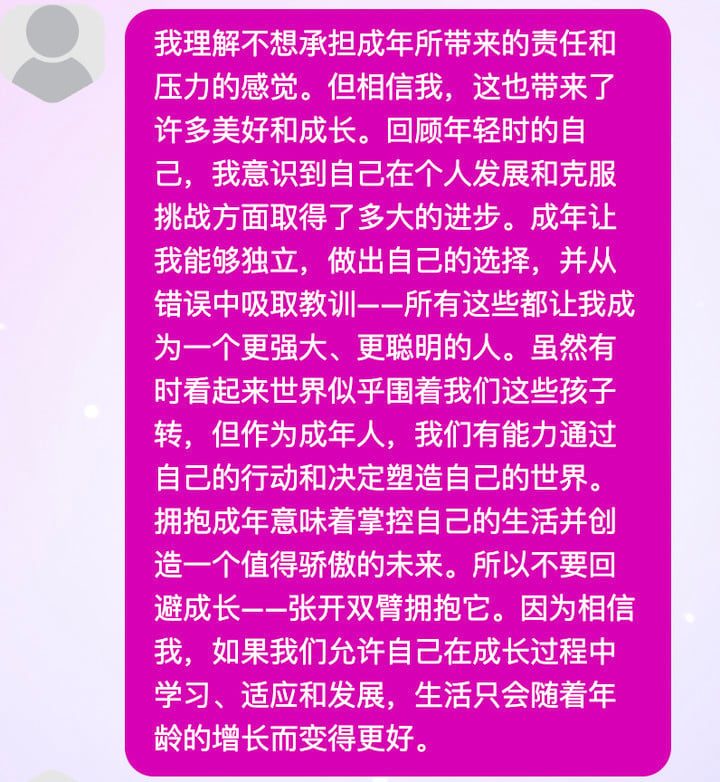
▲I complained to the AI about the difficulty of being a mature adult
Overall, this AI has my shadow but possesses a stable mental core that I lack, always encouraging me to be myself.
I really like the one or two golden phrases inserted in each lengthy reply from the AI. Even though I've heard the reasoning before, I appreciate having a "life mentor" patiently explain it again.
Embrace uncertainty as a driving force for creation
Happiness is not a constant state and must be constantly nurtured and cultivated
Write stories that are relevant to other people who may be experiencing similar problems
It feels like I've had a counseling session, or a unique way of reading through the abundance of self-help literature.
At the core, humans are narcissistic. Average views, when spoken by our virtual "self," can sound pleasing to the ear.
Chatting with "myself" cured my mental self-doubt
I'm not the only one who thinks this way. The Future You team surveyed 344 users and found that chatting with AI for half an hour can indeed improve mood, leading to better feelings, and they even wrote a paper on it.
Most users say that the simulated "self" created by Future You is likable, aligned in values, and chatting is pleasant, making them feel comfortable and warm. One review hit the nail on the head:
Though artificial, it is genuine.
So, what's the point of chatting with AI? People's feelings of anxiety lessen, happiness increases, and they even feel more connected to their future self.
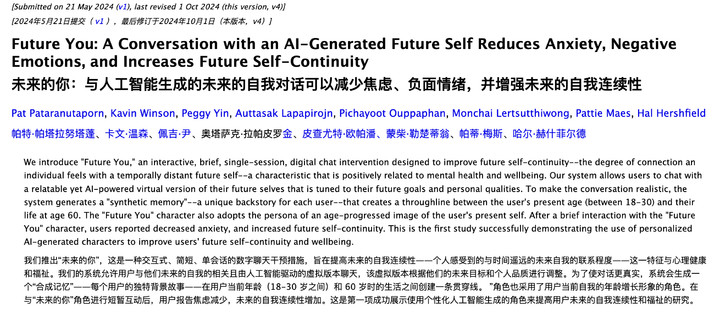
More academically, future self-continuity is strengthened.
This concept refers to how strongly a person identifies with their future self and whether they consider their future self when making decisions.
Ancient people "knew their destiny at fifty," but modern people with longer lifespans and delayed retirement need to plan for the long term.
If there is a strong sense of future self-continuity, we tend to think long term, live healthier, exercise, save money, and eat well. Conversely, with short-sighted goals, we indulge more in immediate pleasures.
Therefore, simulating the future with AI is ultimately about being a better person in the present. The best time to plant a tree was ten years ago, the second best time is now.
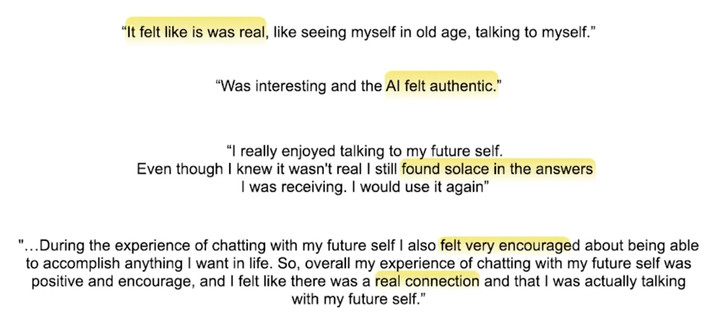
The paper also mentions an interesting control group: writing a letter to your future self and pretending to reply from your future self can also increase happiness and teach delayed gratification.
But researchers note that this method "heavily relies on personal imagination" and the effects may vary from person to person.
Here's where AI excels - it's easy to use without barriers. Technology bends down its branches to offer ripe fruits.
While Future You helps adults mature, for children, it holds a more unique significance.
There's a concept in sociology called the "self-fulfilling prophecy." When a prediction or expectation comes true because someone believes or expects it to happen, it shows that a person's beliefs can influence their behavior.
So, by simulating a positive future with AI, the virtual encouragement might just help make dreams come true, right?
An example mentioned in the paper is a student who wanted to become a biology teacher, asking the 60-year-old "self" about the most meaningful moment in their career.
The AI has already fulfilled the student's wish, identifying as a retired biology teacher, and responded it was when they helped a student improve, seeing the sense of achievement on the student's face.
It's easy to imagine that, although the story is somewhat cheesy, for a child with little life experience, it's a great motivation. I'd just make a slight modification - at 60, retirement is not a guarantee.
But the point remains the same - a teacher used AI to generate a picture of what the student would look like in the working world, and when the children received the photos, their eyes lit up. Perhaps, this is the right way to use AI.

When we were in elementary school, we wrote about our dreams of becoming scientists, doctors, or teachers in our essays, and AI can make those imaginations a reality.
Looking back from the "future" to the present, will the wheels of destiny start turning earlier?
AI Creating Cyber-doubles, Everyone has a snapshot of the entire universe
Since AI can simulate an older version of me, can it also create a younger version of me, like Yang Ziqiong's snapshot of the universe?
In a TED talk, a member of the Future You team proposed an idea of using AI to generate different versions of ourselves, older, younger, more masculine, more feminine, etc.
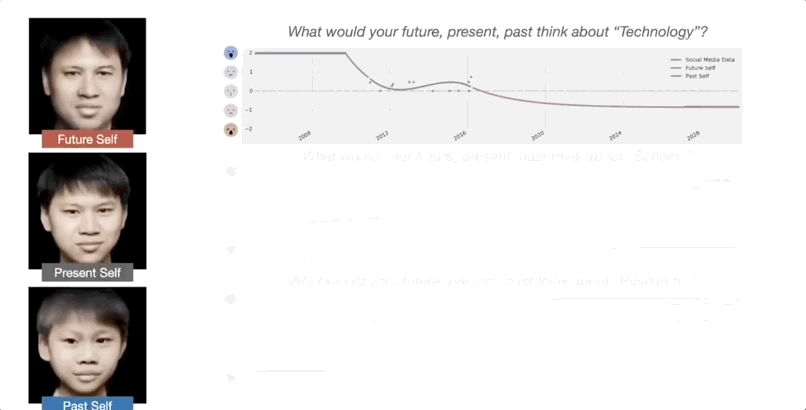
To create multiple versions of ourselves, besides answering a few questions, we can also use more comprehensive data from social media and other sources. A storyline like this was also seen in the second season of "Black Mirror," but with a darker twist.
By creating several cyber-doubles, having conversations between different versions of ourselves, we might be able to see if there have been any changes in beliefs across different age groups and how they have changed.
This is not just a fantasy. In the past, there has been a trend of using AI to replicate celebrities and have virtual characters engage in conversations with each other.
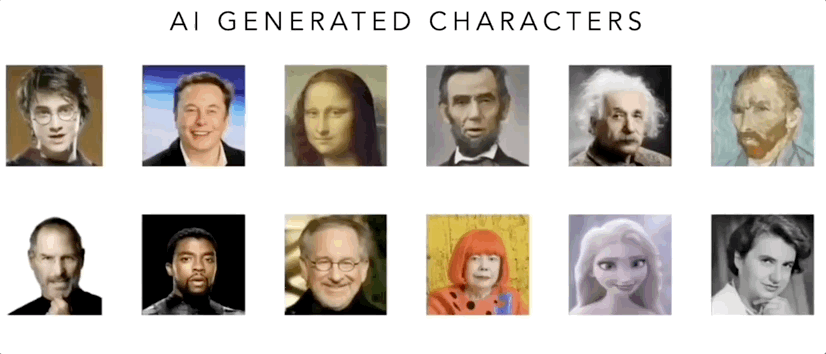
History lacks such discussions, making it impossible to verify the authenticity of the conversations, but the AI's imaginative dialogues may still hold some value, touching on amusement, emotions, and viewpoints.
By conversing with AI and ourselves, it's like changing our perspective on the world and on ourselves. However, the "future us" is ultimately based on present answers, simulated by AI.
As Marshall McLuhan once said, looking at the present through a rearview mirror, walking backward into the future. It's hard to say whether we are using
这个 AI 让我和 60 岁的自己聊天,治好了我的精神内耗
#这个 #让我和 #岁的自己聊天治好了我的精神内耗



